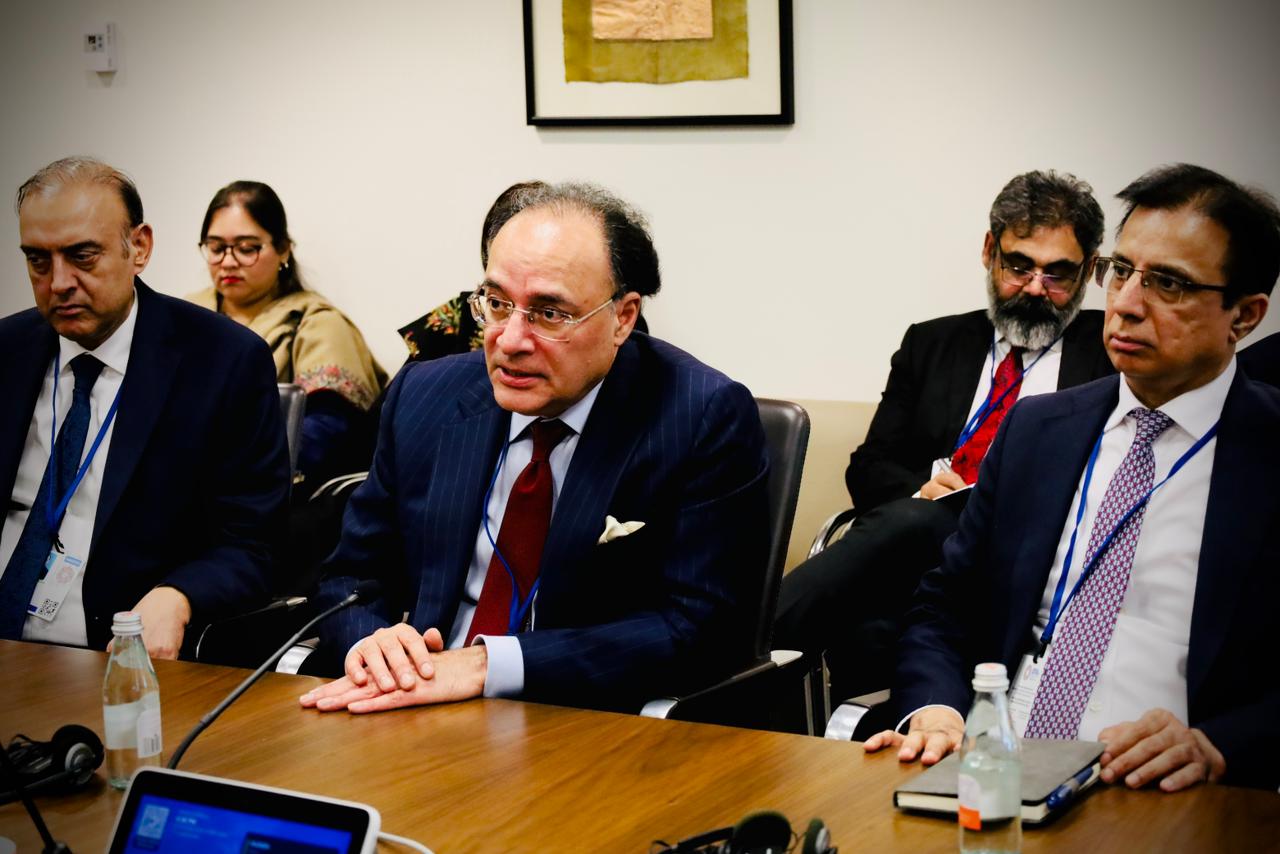
Washington D.C. October 14, 2025(Ghufran): Federal Minister for Finance and Revenue, Senator Muhammad Aurangzeb, continued his high-level engagements on the second day of the IMF–World Bank Annual Meetings, holding a series of pivotal discussions with senior officials from the U.S. Government, international financial institutions, the Saudi Fund for Development (SFD), and leading global investors. The meetings reinforced Pakistan’s commitment to economic reform, fiscal stability, and long-term growth. The Finance Minister held a productive meeting with Mr. Emory Cox, Special Assistant to the U.S. President for International Economic Relations; Mr. Ricky Gill, Senior Director for South & Central Asian Affairs; and Mr. Pierre Yared, Acting Chair of the Council of Economic Advisors at the White House. Recalling his recent interactions with U.S. Commerce Secretary Howard Lutnick and USTR Ambassador Sarah Greer in July, the Minister emphasized the importance of translating the emerging consensus on trade into a broader economic partnership. Discussions focused on investment opportunities in energy, minerals, agriculture, technology/IT, and digital assets. The Minister also conveyed Pakistan’s appreciation for the U.S. government’s expression of condolences over recent flood-related losses.
Senator Aurangzeb also met H.E. Sultan Abdulrahman Al-Marshad, CEO of the Saudi Fund for Development (SFD), reaffirming the strategic partnership between Pakistan and the Kingdom of Saudi Arabia. He thanked the SFD for its support through the Saudi Oil Facility and sought further collaboration on key infrastructure projects including the Hyderabad–Sukkur Motorway (M-6), Main Line-1 (ML-I), skills development initiatives, and IT infrastructure. He welcomed the SFD’s assurance of continued support for Pakistan’s digitalization agenda. In a constructive meeting with Mr. Nigel Clarke, Deputy Managing Director of the IMF, the Finance Minister acknowledged the IMF’s appreciation of Pakistan’s program performance and reaffirmed the government’s commitment to sustaining the trajectory of stability and reform. He thanked the IMF for its support in the second review of the Extended Fund Facility (EFF) and the first review of the Resilience and Sustainability Trust (RST), expressing hope for an early Staff-Level Agreement (SLA). In his address at the G-24 Ministers & Governors’ Meeting, the Finance Minister highlighted Pakistan’s macroeconomic stabilization achieved through structural reforms in taxation, energy, and state-owned enterprises (SOEs). He also emphasized the role of regional trade corridors and the importance of global cooperation on climate change.
At a roundtable hosted by Jefferies International, Senator Aurangzeb engaged leading institutional investors, briefing them on Pakistan’s economic outlook, fiscal and monetary developments, external sector dynamics, and ongoing IMF engagement. He outlined reforms in taxation, energy, and privatization, as well as export-boosting tariff policies. The session concluded with a robust Q&A exchange with investors. In his meeting with Mr. Ousmane Dione, Regional Vice President for MENAAP at the World Bank, the Finance Minister reaffirmed Pakistan’s commitment to the effective implementation of the Country Partnership Framework (CPF), supported by a comprehensive implementation plan developed with full provincial participation. He underscored the importance of optimizing access to IDA financing windows and sought World Bank support for a long-term flood mitigation program under the CPF to bolster climate resilience. The Finance Minister also met Mr. Ahmed Abdelaal, Group CEO of Mashreq Bank, to celebrate the bank’s successful commercial launch in Pakistan. He expressed confidence that Mashreq’s entry will strengthen Pakistan’s financial ecosystem and drive innovation. He reaffirmed the government’s commitment to ensuring a supportive policy environment for the growth of the financial sector.
Senator Aurangzeb participated in the Mission Agri-Connect: Farms, Firms & Finance for Jobs dialogue, where he underscored agriculture’s central role in Pakistan’s economy. He advocated for reduced government intervention in procurement and price controls, coupled with enabling mechanisms such as subsidized financing, first-loss guarantees, and uncollateralized credit for farmers. He also highlighted the need for private sector investment in cold chain logistics, warehousing, and value addition in horticulture. He commended the World Bank’s 10-year CPF for its focus on climate resilience and decarbonization, aligning with President Ajay Banga’s call to replicate proven development models.